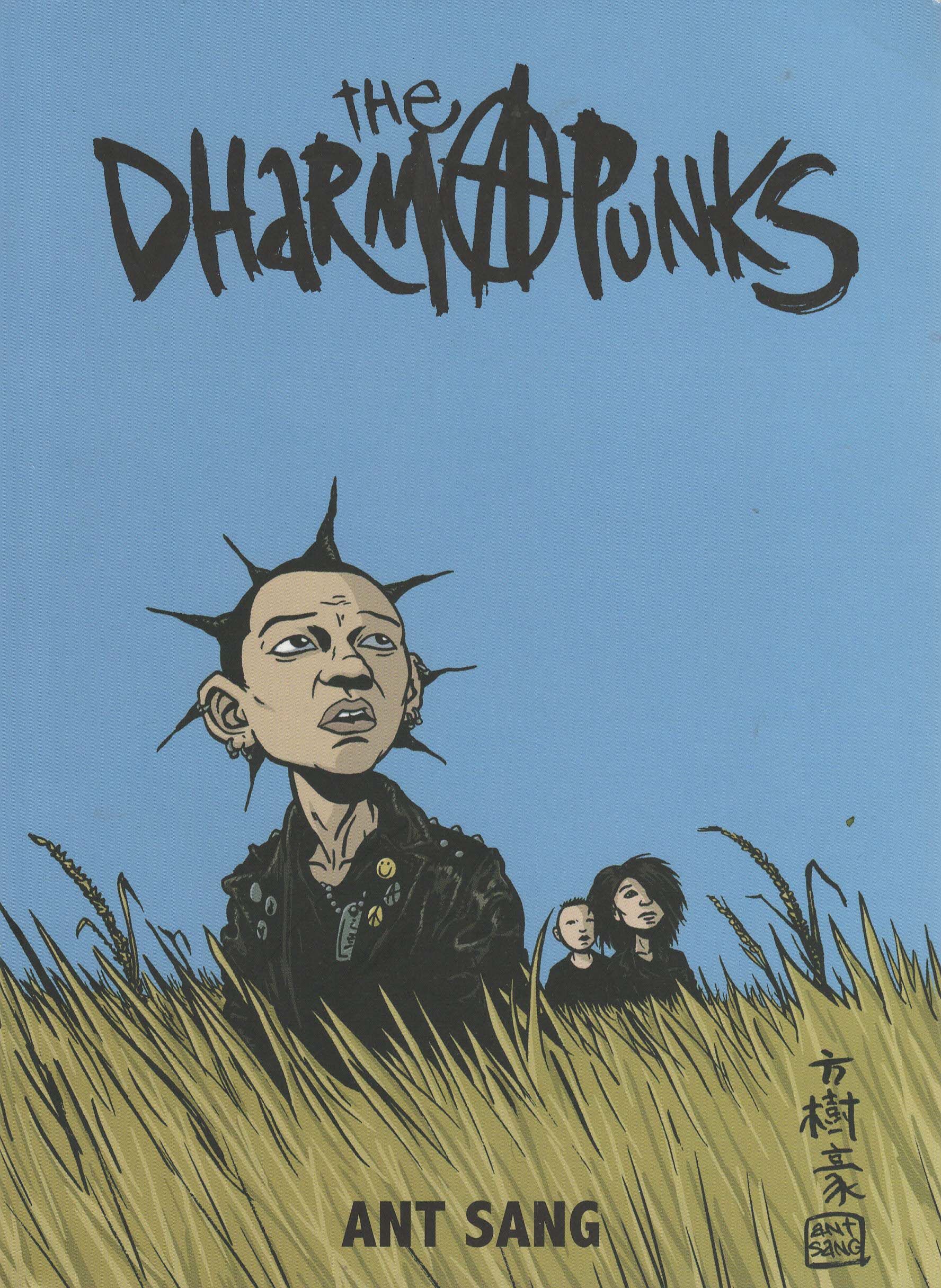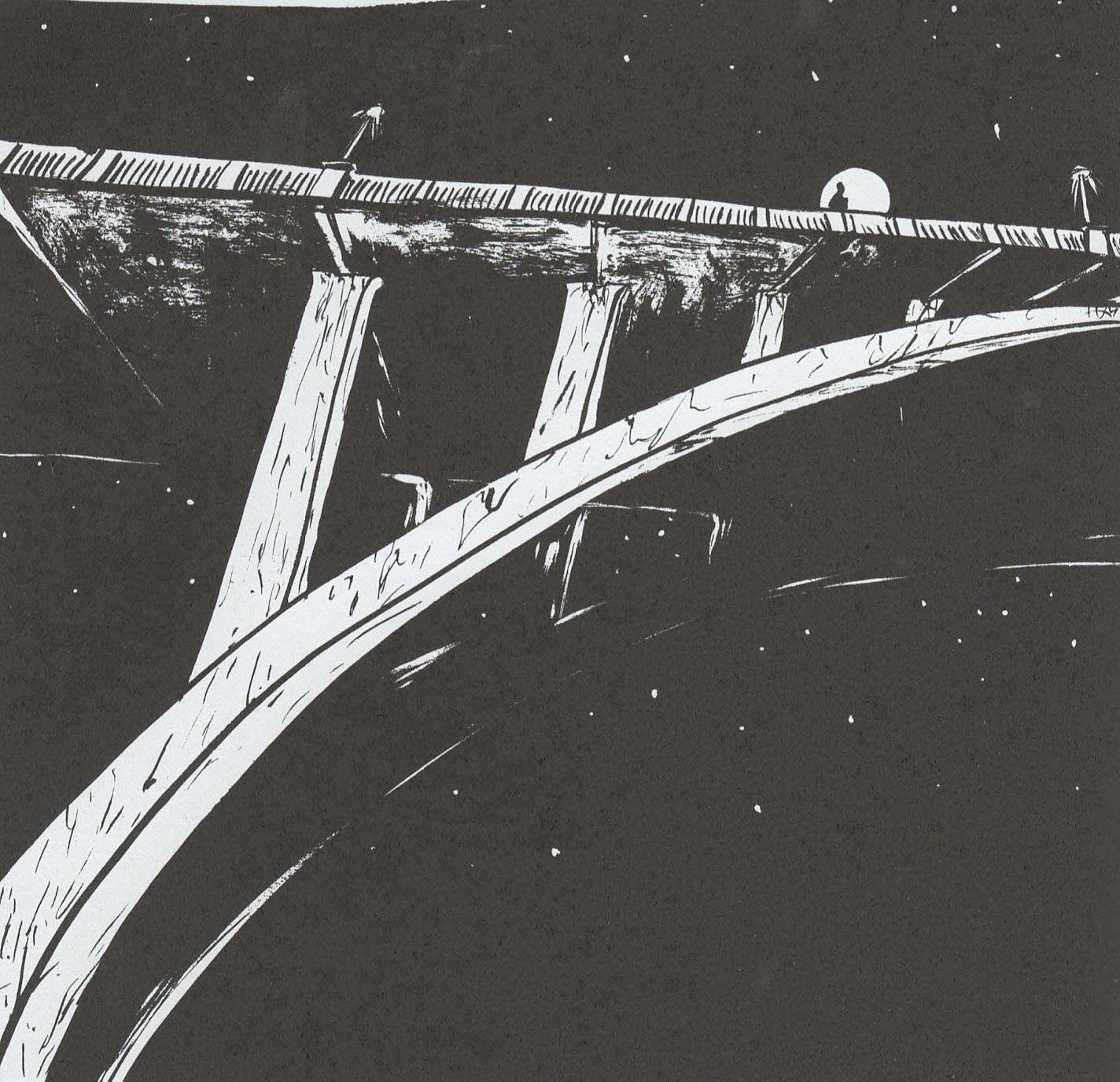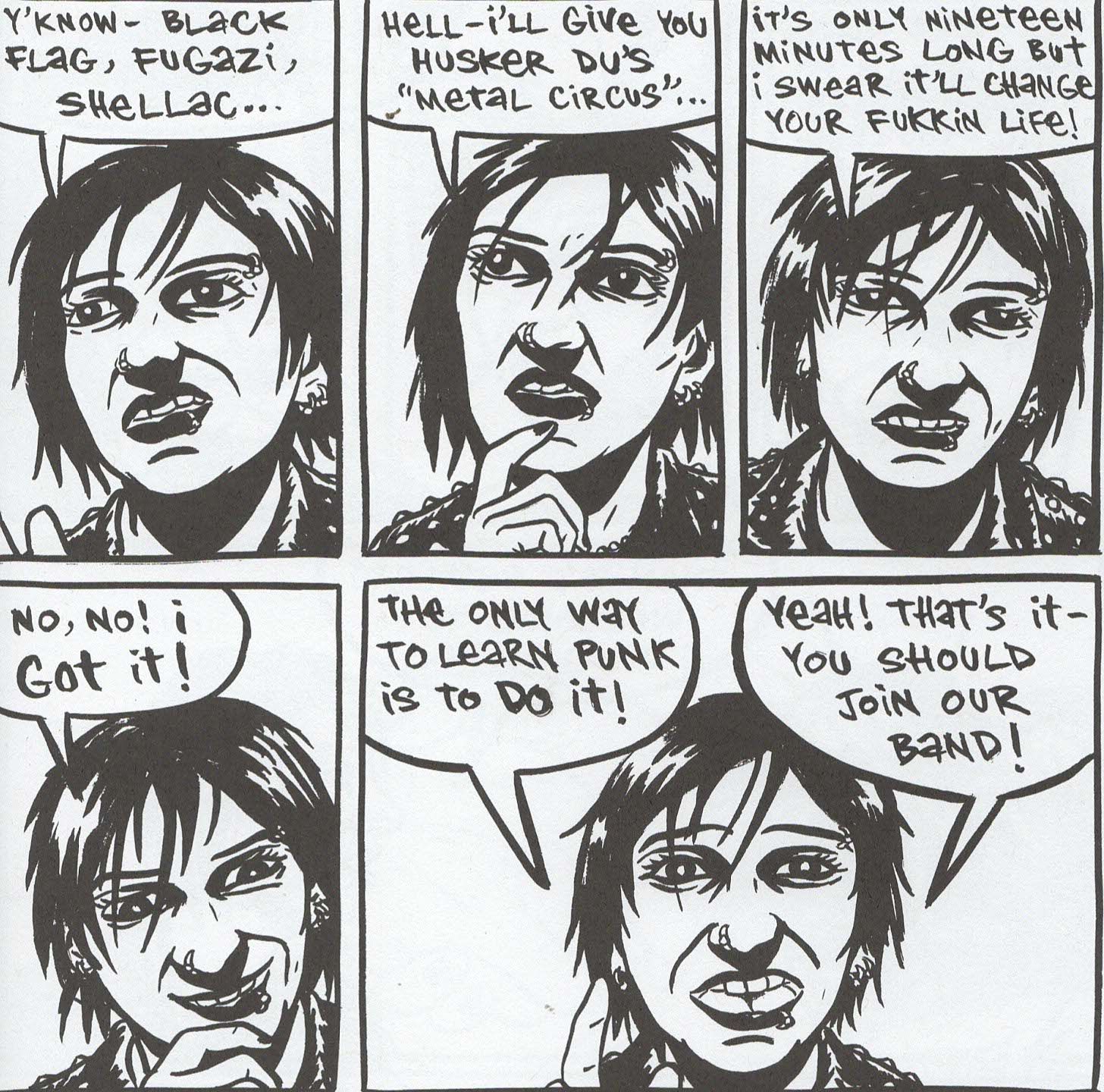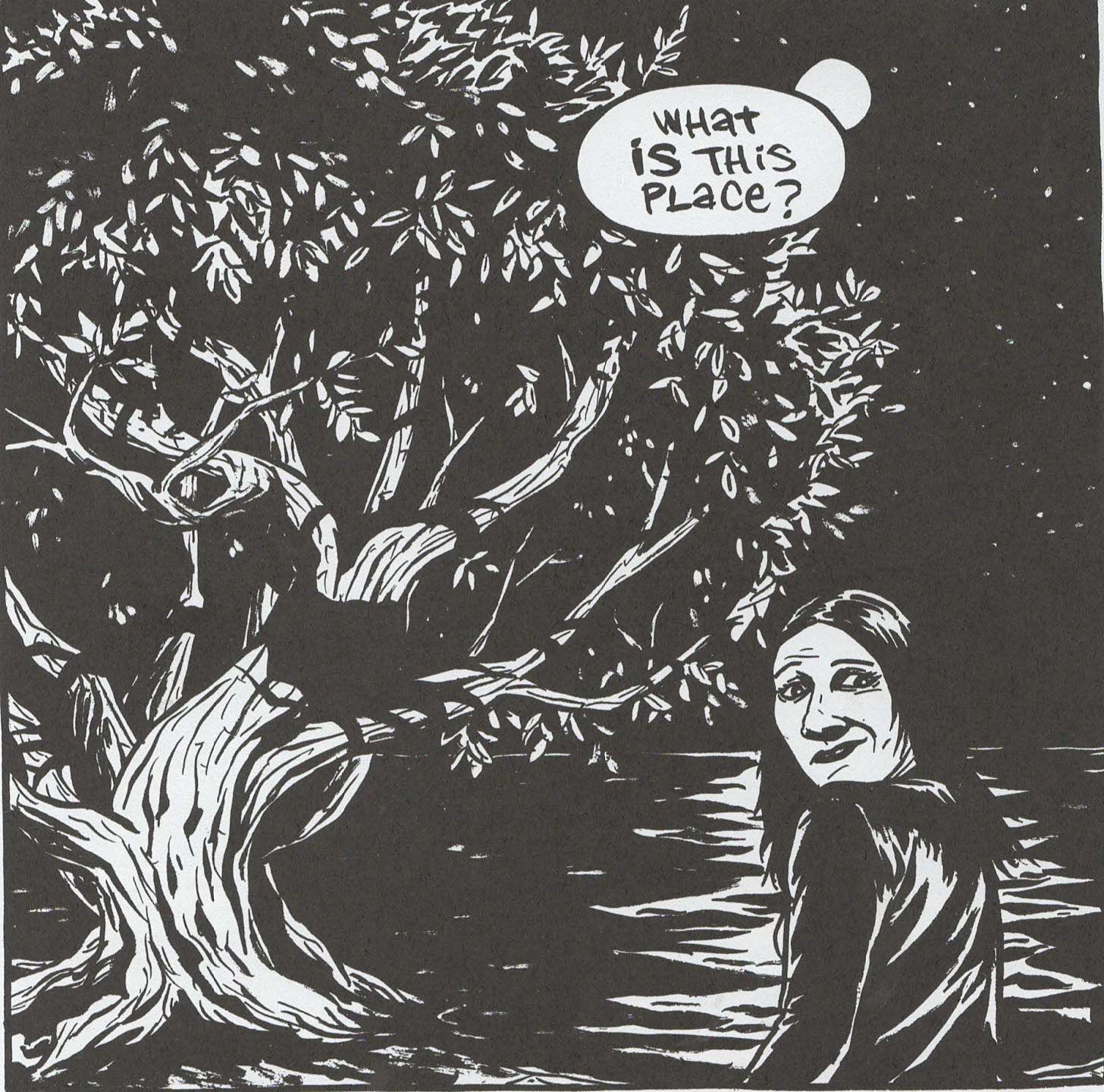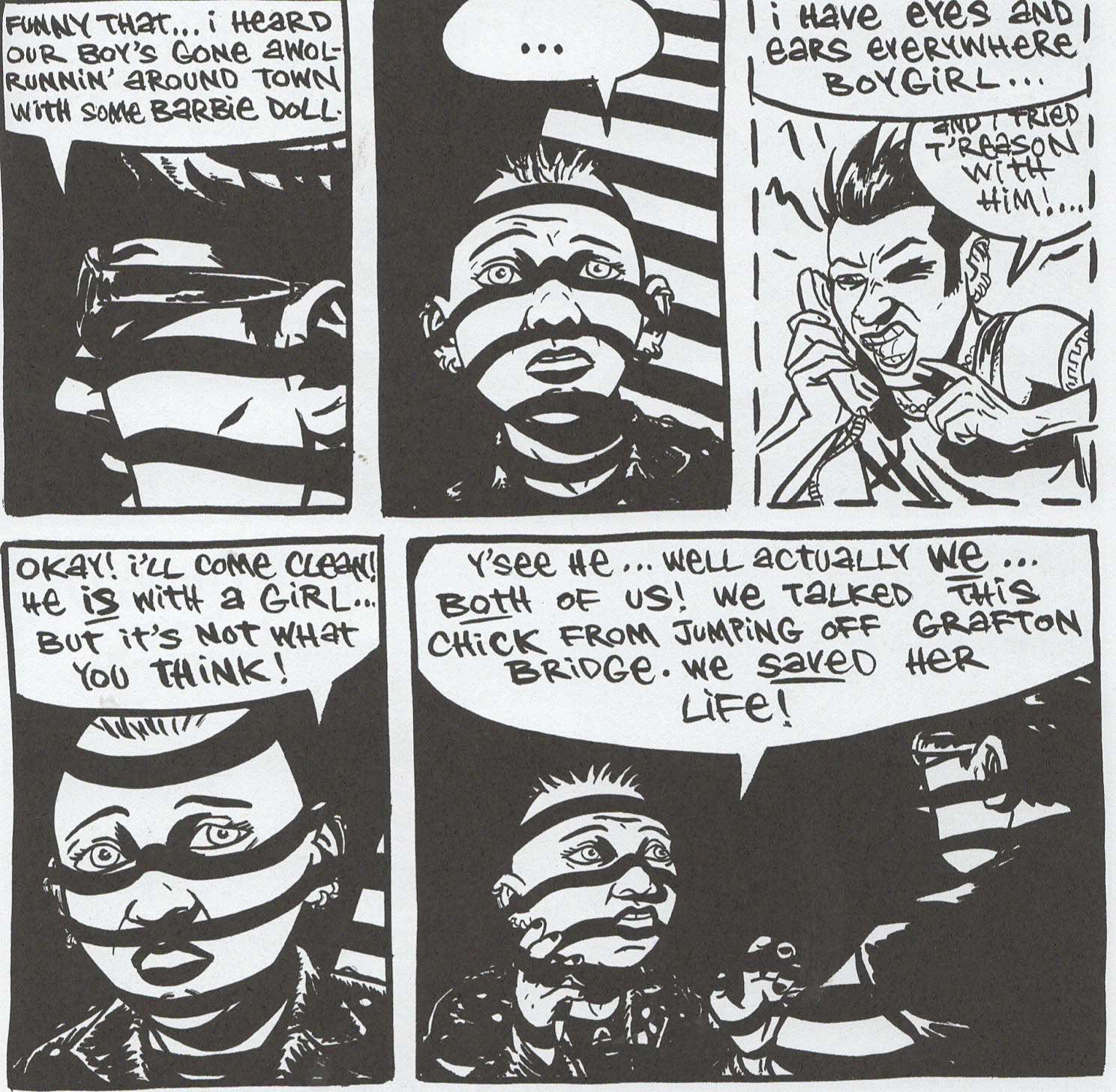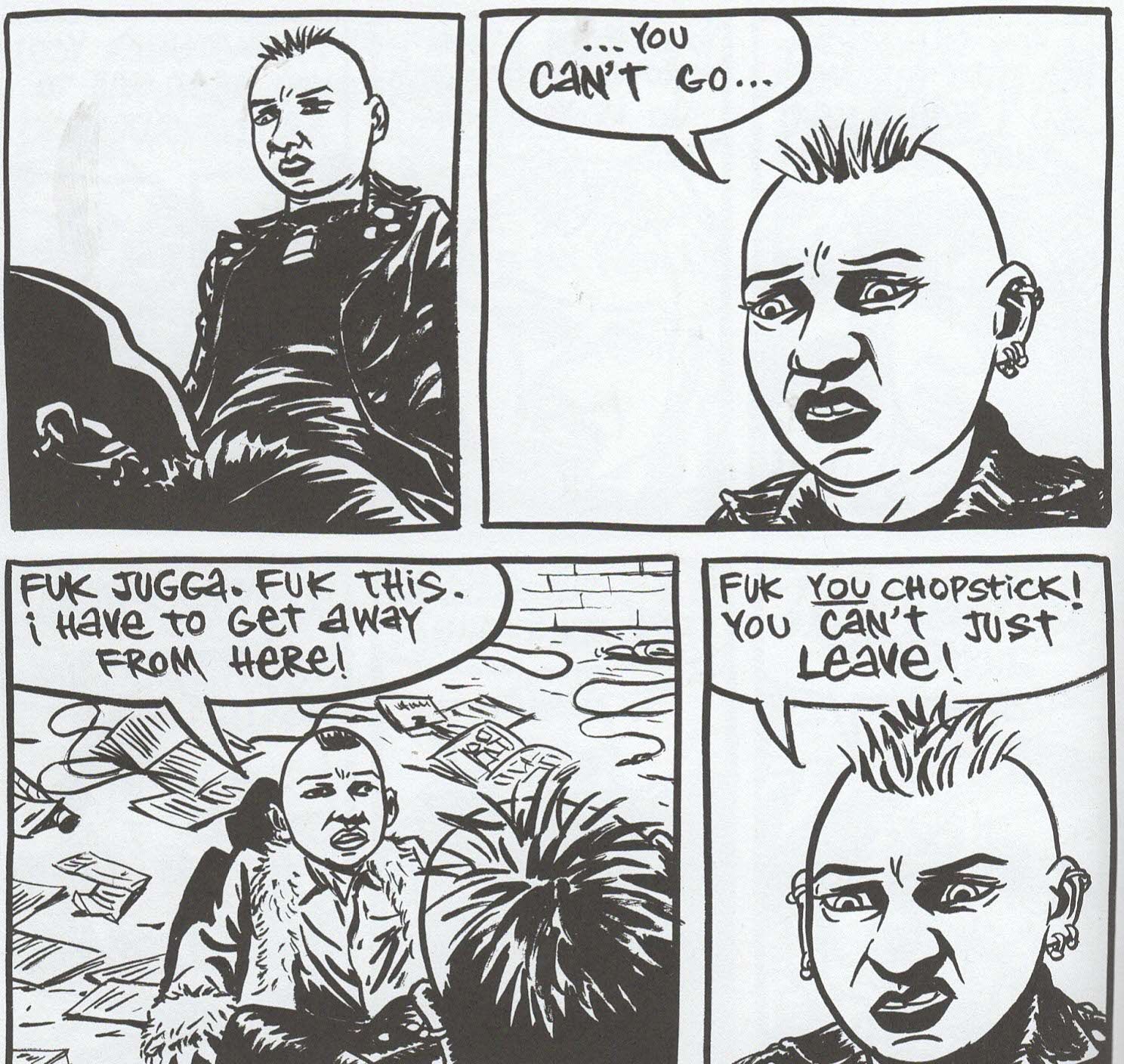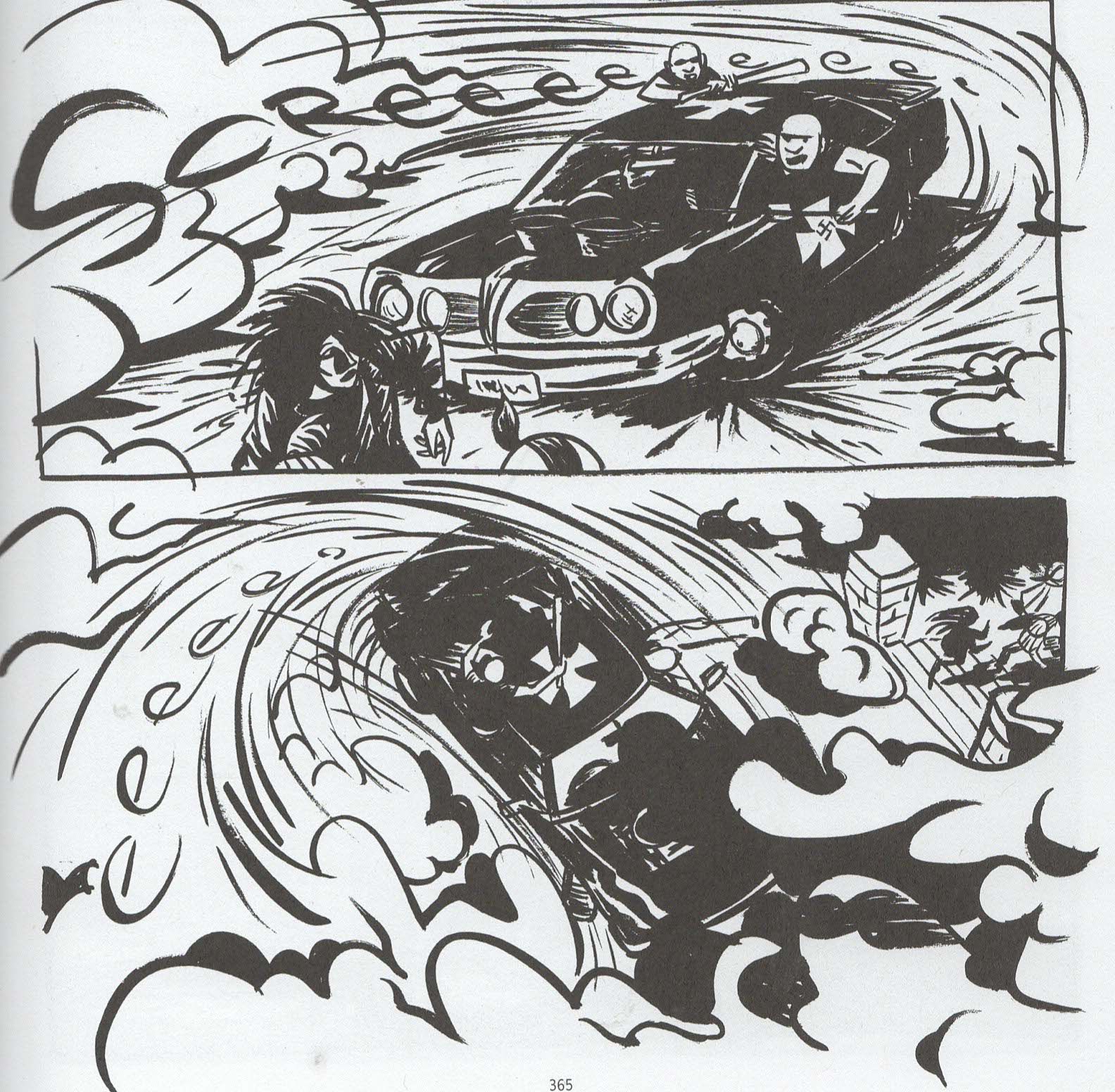"I'm all tied up and my eyes are shut, and these chains I've made they're too tough to cut"
Dylan Horrocks, who writes the introduction to The Dharma Punks, Ant Sang's 8-issue comic about a group of New Zealand punks wandering around Auckland on one night in 1994, explains that it was a big-time success in the country when it first came out in 2001, but it never got collected and fell out of print.
Conundrum Press has finally collected it and priced it at $25, so if you're curious about what 20-year-old comics from New Zealand look like, here's your chance to find out!
I'm of two minds about Dharma Punks. On the one hand, it's a pretty good comic. On the other hand, I'm so over stories about rebellious kids who spout dumb philosophy. Frankly, I was never really into them even when I was a youngster - I guess I never had much to rebel against, so I didn't relate too much to kids who did rebel. So while I was reading this, I wasn't as impressed as I might have been 20 years ago, and I definitely wasn't as impressed as people who have rebelled against something might be. I know this is a "me" problem, but we all bring our own history and prejudices to anything we consume, so if you have a history of rebellion and punk rock, this might speak to you more than it did to me. Even if we can rise above our prejudices and appreciate the artistry of the work, the gut feeling remains, and that's hard to dispense with. So I can look at Dharma Punks and appreciate it on an intellectual level while not connecting to it on a more animalistic level. C'est la vie.
One place Sang's book works beautifully is with the artwork, which is rough and rowdy, much like punk rock itself.
His characters are beaten up by life, so we can see why they would turn to nihilism as a life choice, but Sang imbues them with a harsh beauty and nobility that brings them alive wonderfully. Chopstick, the main character, has an eager vulnerability in his face, willing to trust too many people with too many things, which gets him into trouble throughout the book. Sang gives him an expansive palette of wide eyes, quirked-up mouth, and furrowed brow to show how the world is disappointing him even as he expects it to make sense, and it's more heartbreaking than his dialogue makes him. Tracy, one of Chopstick's friends, is a terrific punk, with a short crop of hair and so much rage in her face that when she freaks out at Chopstick toward the end, it's amazing how many emotions Sang puts her through, as she's angry, scared, and disappointed, all at once. She never expresses a love for her friend, but Sang puts it on her face when he announces he's leaving Auckland - it crushes her, and Sang shows that wonderfully. Chopstick, meanwhile, is haunted by the absence of another friend, a girl who formed their band and inspired him to grab life by the balls but then went away (we do find out what happened to her, so I won't spill it), and Sang does a good job with her in her brief scenes, showing her fire and her wry outlook on life, as well as the pain she lives with.
My favorite character is Mewt, who is ... well, mute (Chopstick comments on the joke). As she doesn't talk and uses a writing pad to communicate, Sang needs to make her more expressive than the others, and he does a fantastic job with her. Chopstick meets her on the Grafton Bridge, an Auckland landmark that is, naturally, a magnet for suicides, but she's not planning on jumping, she just likes looking at the city from the perch. After he "rescues" her, he follows her on a journey through Auckland, and does a great job showing that she knows most of what Chopstick says is bullshit (he's a confused Buddhist), but she doesn't call him on it too much because she cares about him. She mocks him gently for claiming that life means nothing but is unwilling to step outside his comfort zone (such as it is), and she has a wicked sense of humor. Sang does this all through the way she looks at him, and it's really impressive. He does a lot of other good stuff with the art, too. The warehouse where Chopstick and his friends crash is a beat-up place with old posters on the walls, and Sang scribbles all over the rest of it to make it appear like it's about to fall down. Chopstick and Mewt end up at a punk concert, which is an amazing crush of humanity, and Sang does a fantastic job showing Chopstick's anxiety as he loses Mewt in the crowd. Then he climbs up on stage and we get a wonderful sequence of him jumping onto the crowd to surf, which Sang links to suicides throwing themselves off the bridge and his connection to everyone on Earth. He uses paint splatter to make the light fuzzier, and he uses really nice perspective to induce some vertigo in the readers as Chopstick's consciousness flies out of his body.
There's also a great scene in which Tracy is confronted by Jugga, the main villain of the book, and she's standing by Venetian blinds so the inky shadows stripe her face, which is a cliché, of course, but still looks great, pushing her into a cage that she can't escape because Jugga is standing in the way. Throughout it all, Sang's inks are amazing - he uses wonderfully thick blacks to make all the leather the punks wear crackle, he throws people into shadowy corners, and he uses different line weights to contrast the cleanliness of the fast food restaurant that figures prominently in the book with the scuzziness of the kids' warehouse. Mewt takes Chopstick to a lake at one point, and Sang gives us a beautifully inked tree on the shore and the thick, black water, sucking Chopstick in and allowing him to drift away. He uses gouache really well to show rain against the black night, making the drops thicker and more tangible, which keeps with the heavy reality of Chopstick's world, which is just to contrast his desires to transcend it. Sang's line work is pretty good, but his inking really elevates the art.
His story is a bit of a letdown, even though it's not terrible. The entire "present" of the comic takes place on one day in October, 1994 (there are flashbacks and flashforwards), as Chopstick and his friends are roped into a job by Jugga, a local thug.
Jugga wants them to blow up a fast food restaurant, Bobo's, on the day it opens, and their plan is to infiltrate it the night before, plant the bomb, and all hail anarchy, I guess. Things go sideways, as they do, mainly because Chopstick meets Mewt, who fascinates him, and he always puts off his part of the job, which is actually planting the bomb. He has to do it, though, because Jugga is not a man to be trifled with, but his night with Mewt takes an already ambivalent revolutionary and makes him even more compassionate, so he's not sure if he wants to take the chance that the bomb will kill innocent people. It's not a bad story, but Sang adds a lot more, as it's a dense 8 issues. Chopstick is a Buddhist, so he and his friends engage in all sorts of philosophical arguments that sound clever when you're 20 but don't make a lick of sense. He's haunted by the disappearance of his friend, and that colors how he reacts to Mewt, and that's partly why their relationship is so wonderful. There are a few dull but quick asides with Kurt Cobain, who is a reference point - both positive and negative - for the kids, but it's not too egregious. As I noted above, part of the reason I don't love this book as much as some people is because the kids are rebelling, but we never get a sense that their worlds are that shitty. We don't see their home life, their school life, or anything that would drive them to rebel (except in one instance, which is heartbreaking and shows that Sang could give them more depth if he wanted to). They appear to be punks just because it's something to do, which is annoying. Chopstick and Tracy vandalize a butcher shop at some point, and the butcher sees Chopstick, and instead of being sympathetic to this guy who's just trying to earn a living, Sang makes him a horrible racist who calls his skinhead son and his gang to find the "gook" who messed up his store so we have to be on Chopstick's side.
Sang stacks the deck, in other words, and even the presence of skinheads who want to kill Chopstick isn't enough to make his situation more interesting, because he is, after all, a vandal (and we have no reason to believe the butcher is persecuting Chopstick, either, even though he's racist). It's why Chopstick's relationship with Mewt is so good - it's a human connection, and as it flows out of Chopstick's feeling of betrayal by his other friend, his complicated emotions about Mewt are wonderful, but the trappings around it just aren't that well done. Protesting against the corporate restaurant is fine, but again, Sang stacks the deck - the adverts for Bobo's actually read "consume," which just makes the restaurant comically evil. So it's tough to take the big plot too seriously, but the small moments of Chopstick's long dark journey of the soul are quite well done when he's not spouting philosophy. I freely admit I might be in the wrong headspace for this comic, but that's the only headspace I can be in, ain't it?
I don't love The Dharma Punks, but it's a pretty good comic and it's a nifty little cultural curio about a bygone time and place, which is always kind of cool. The art is better than the story, but the story isn't bad, just a bit obnoxious at times. I get that Sang is doing it to show more of the culture of Auckland punks, and that's fine, but it does get overwhelming. Luckily, he does some good work with the core personalities of the main characters so their pontificating doesn't get too annoying. It's not a great comic, but it's something that I'm glad I own. So there's that.
Rating: ★ ★ ★ ★ ★ ★ ½ ☆ ☆ ☆

